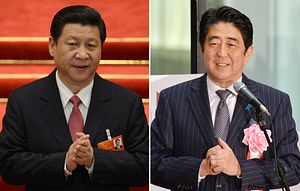A lot of media attention has focused on whether or not Japan’s prime minister, Shinzo Abe, will attend China’s military parade on September 3. The most recent news reports claim that Abe has decided to skip the China trip; if true, this would represent big setback for Abe’s foreign policy, especially with regard to China-Japan relations. Of course, there are some good reasons for Abe not to attend the parade, but all reasons considered, it is obvious that Abe should attend, for Japan’s sake and for the sake of the region. Specifically, there are four good reasons why Abe should attend the military parade on September 3 in Beijing.
First and most importantly, Abe’s attendance can send a strong signal to China that China-Japan relations can be substantially improved. It is unfortunate that since 2012 China-Japan relations have not been normal and, despite some efforts from both sides, improvements are still elusive. There is no doubt that both China and Japan are vital to each other’s future development, evidenced by the simple fact that China is the world’s second largest economy and Japan is the third. Unless these two Asian giants can effectively cooperate, East Asia will not be in a normal and stable state. Abe’s attendance surely will meet some domestic resistance, but for an aspirational politician like Abe, the future of Japan and East Asia should be much more important than a few votes.
Second, Abe is struggling domestically because of his controversial legislation to expand the role of Japan’s military. The fundamental reason for the strong resistance among Japan’s civil society is the fear that the new legislation will push Japan into a serious military conflict with China. Japan has enjoyed 70 years of peace since the end of WWII, and now most of its citizens don’t want to get into another military conflict anywhere in the world, not to mention with the country’s most important neighbor, China. Perhaps ironically for Abe, who clearly sees China as a potential threat, an improvement in China-Japan relations would actually help build support for his controversial legislation. Improved China-Japan relations would significantly reduce the perceived threat of China in Japan and lead to a much lower probability of military conflict between China and Japan. If this is the case, then Japanese citizens’ fear of a military conflict would also decrease, possibly leading to more support for Abe’s legislation.
Third, Abe is a strong leader in Japan, though his approval ratings have been dropping in recent months. Abe’s right-wing political allies might have the most to lose from Abe’s attendance at China’s military parade because to them it would symbolize China’s victory over Japan again. The right-wing groups must be putting a lot of pressure on Abe these days, but Abe must firmly resist their pressure. If history is any indication, September 3 has the potential to become a ‘Nixon goes to China’ moment for Abe. In the end, Abe might pay a political price for his attendance in China’s military parade, but it will be a small price compared to the large gains derived from the visit.
Fourth, though the United States might not like the idea of Abe’s attendance in China’s military parade, it will grudgingly accept it if Abe makes that decision. Abe’s final decision will necessitate consultation with the United States, the country’s close partner. There are some reasons why the U.S. might not want China to look like a big victor in front of the whole world on September 3, but ultimately the U.S. should not and will not pay too much attention to that one event. There are other more important things for the U.S. to worry about currently (like its struggling economy, which is closely tied to China’s economy, by the way). For the sake of maintaining peace and stability in East Asia, the U.S. should support good China-Japan relations.
To conclude, Abe’s attendance at China’s military parade is a golden opportunity to improve China-Japan relations, if this is what Abe indeed wants for the two countries. Of course, China should make a nice gesture to make sure that Abe’s attendance is not a moment of humiliation for Japan. Both sides can make sincere efforts to resolve the thorny historical issue in China-Japan relations.

































